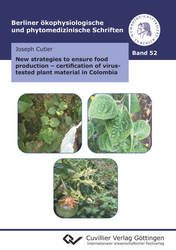| Departments | |
|---|---|
| Book Series (97) |
1381
|
| Nachhaltigkeit |
3
|
| Gesundheitswesen |
1
|
| Humanities |
2370
|
| Natural Sciences |
5407
|
| Mathematics | 228 |
| Informatics | 319 |
| Physics | 980 |
| Chemistry | 1364 |
| Geosciences | 131 |
| Human medicine | 243 |
| Stomatology | 10 |
| Veterinary medicine | 108 |
| Pharmacy | 147 |
| Biology | 835 |
| Biochemistry, molecular biology, gene technology | 121 |
| Biophysics | 25 |
| Domestic and nutritional science | 45 |
| Agricultural science | 1005 |
| Forest science | 201 |
| Horticultural science | 20 |
| Environmental research, ecology and landscape conservation | 148 |
| Engineering |
1798
|
| Common |
98
|
|
Leitlinien Unfallchirurgie
5. Auflage bestellen |
|
Advanced Search
New strategies to ensure food production (Volume 52) (English shop)
Certification of virus-tested plant material in Colombia
Joseph Cutler (Author)Preview
Extract, PDF (4.1 MB)
Table of Contents, PDF (140 KB)
This thesis presents the major viruses affecting three cultivars in Colombia and how experimental approaches in serology, molecular biology, and bioinformatics can be adapted to create a protocol that could be applied for physalis, passionfruit, ornamental rose, and eventually other crops.
Selection of farms was carried out based on size and economic importance. Initial visual plant symptom appraisal led collection of 370 samples from 20 farms. Literature review guided the selection of antibodies of known viruses for initial ELISA testing. Thereafter NGS was carried out to discover further known and novel viruses in the cultivars. Various experiments were carried out on different samples including biotest inoculation, ELISA, RT-PCR, and NGS.
Reliable and practical diagnostic tools like these could be developed for the most important viruses leading to a national agricultural certification program that could be established in a common project between German and Colombian universities, the Colombian Agricultural Institute (ICA), the Colombian Corporation of Agricultural Investigation (AGROSAVIA), and the International Center for Tropical Agriculture (CIAT).
In dieser Arbeit werden die wichtigsten Viren vorgestellt, die drei Sorten in Kolumbien betreffen, und wie experimentelle Ansätze in den Bereichen Serologie, Molekularbiologie und Bioinformatik angepasst werden können, um ein Protokoll zu erstellen, das für Physalis, Passionsfrucht, Zierrose und eventuell andere Kulturen angewendet werden kann.
Die Auswahl der Betriebe erfolgte nach Größe und wirtschaftlicher Bedeutung. Die erste visuelle Beurteilung der Pflanzensymptome führte zur Entnahme von 370 Proben aus 20 Betrieben. Die Literaturrecherche leitete die Auswahl von Antikörpern bekannter Viren für erste ELISA-Tests. Danach wurde NGS durchgeführt, um weitere bekannte und neuartige Viren in den Sorten zu entdecken. Verschiedene Experimente wurden an verschiedenen Proben durchgeführt, einschließlich Biotest-Inokulation, ELISA, RT-PCR und NGS. Solche zuverlässigen und praktischen Diagnosewerkzeuge könnten für die wichtigsten Viren entwickelt werden, die zu einem nationalen Agrarzertifizierungsprogramm führen, das in einem gemeinsamen Projekt zwischen deutschen und kolumbianischen Universitäten, dem Colombian Agricultural Institute (ICA) und der Colombian Corporation of Agricultural Investigation (AGROSAVIA), und das Internationale Zentrum für tropische Landwirtschaft (CIAT) eingerichtet werden könnte.
| ISBN-13 (Hard Copy) | 9783736976030 |
| ISBN-13 (eBook) | 9783736966031 |
| Final Book Format | A5 |
| Language | English |
| Page Number | 156 |
| Lamination of Cover | matt |
| Edition | 1. |
| Book Series | Berliner ökophysiologische und phytomedizinische Schriften |
| Volume | 52 |
| Publication Place | Göttingen |
| Place of Dissertation | Berlin |
| Publication Date | 2022-04-28 |
| General Categorization | Dissertation |
| Departments |
Biology
|
| Keywords | Zertifizierung, Lebensmittelproduktion, Kolumbien, Virus, Rose, Physalis, Passionsfrucht, Bioassay, ELISA, RT-PCR, NGS, Serologie, Molekularbiologie, Baumschulen, Bioinformatik, Symptomatologie, Diagnosewerkzeuge, PNRSV, SMV, PFYMV, Ilarvirus, Landwirtschaft, Pflanzenmaterial, Virennachweis, Best Practices, Wissenstransfer, Lebensmittelsicherheit, Nachweis, Primer, Probenentnahme, Fragebogen, Interviews, virale Contigs, HTS, NCBI, BlastX, BIOREBA, EPPO, NAPPO, RPPO, mechanische Inokulation, Kochs Postulate, Certification, food production, Colombia, virus, rose, physalis, passion fruit, bioassay, ELISA, RT-PCR, NGS, serology, molecular biology, nurseries, bioinformatics, symptomatology, diagnostic tools, PNRSV, SMV, PFYMV, Ilarvirus, agriculture, plant material, virus detection, best practices, knowledge transfer, food security, detection, primers, sample collection, questionnaire, interviews, viral contigs, HTS, NCBI, BlastX, BIOREBA, EPPO, NAPPO, RPPO, mechanical inoculation, Koch’s postulates, Sojabohnen-Mosaik-Virus, soybean mosaic virus, Kartoffelvirus, potato virus, National Clean Plant Network, Nationales Netzwerk für saubere Pflanzen, Nationales Zentrum für Biotechnologie-Informationen, National Center for Biotechnology Information, Global Agriculture Information Network, Globales Informationsnetz für die Landwirtschaft, Ulmenfleckenkrankheit, elm mottle virus, Kolumbianischer Stechapfel-Virus, colombian datura virus |
| URL to External Homepage | https://www.agrar.hu-berlin.de/en/institut-en/departments/dntw-en/phytomedizin-en |








